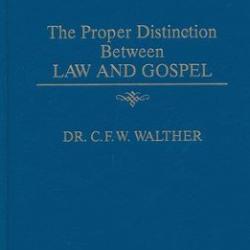
Yes, its not impartial. : ) I write for this blog for a reason.
Anyway, as I said in a recent post, about the new book on Law and Gospel now being released by CPH….(see above):
If someone in the Confessional Lutheran house spoke about the “so-called doctrine of justification,” you could bet that every head would turn.
But say “so-called 3rd use of the law” – using the church’s publishing house meant to provide the most excellent Christian doctrine to the laypersons – and many will yawn, talk about the variety of definitions of “so-called,” yada, yada…
Why don’t people with some real clout fight? Do some housecleaning? Say anything?
[this is the cue to unveil my new book review of Jordan Cooper’s Lex Aeterna…]

[Because] they are afraid. The ideas of Gerhard Forde have infiltrated confessional Lutheran seminaries and colleges in many a local. Dissent may cost you — perhaps not your job, but relationships to be sure. If you criticize at all, make sure you are exceedingly generous with praise as well – and don’t appear like you want any boats rocked.
Jordan Cooper, however, doesn’t belong. He is a convert to Lutheranism who came to the faith largely by reading not 20th century Lutheran theologians, but everyone before that time. As his podcasts show time and again for any with ears to hear – and either the knowledge or research skills to verify – Cooper knows his stuff.
And he knows Gerhard Forde’s theology is trouble. He sees what so many do not want to see. No one in their right mind would deny that Gerhard Forde was a stand-out human being. The trouble, however, is that he is one of the primary forces responsible for letting lose a virus that has given strength, aid, and comfort to Fake Lutheranism everywhere in its most sophisticated forms.
But this is a book by Jordan Cooper, who, in spite of some of what you may have heard, is not only a very loyal confessional Lutheran we are blessed to have on our side, but a warmhearted and ecumenical theologian extraordinaire. If you are looking for fiery and rhetorical-loaded polemics lacking critical nuance, you will be very disappointed with this book.
Cooper does a very nice job of dealing with this topic and breaking it down in a simple way. I never had noticed all the connections he makes, namely how for Gerhard Forde defining absolutely everything by *doing* and not *being* is the rule: “being is defined by act. Everything is defined by what it does, rather than an essence that has independent existence behind that action” (Cooper, 82).

In this sense, Forde is completely in line with the pragmatic postmodernist existentialist Hegelian currents which dominate academia and elite circles today. Don’t worry! This doesn’t need to be complicated at all – that is what Forde and those who follow him have done. Cooper will methodically unveil that to you, reducing things to essentials. Like a good butcher, he carves up things where the joints are.
A sample of his getting to the meat:
“[Forde] purports that if the gospel contains specific doctrines about Christ’s life and death as a substitutionary act then it simply becomes another kind of law which one must accept in order to be saved…. Forde argues that theology which concerns itself with propositions, or with things as they are in their essence, is a theology of glory, or a theology ‘about the cross,’ rather than a theology of the cross….
Forde is even bold enough to say that Christ ‘was not doing anything else in his death but dying’” (92).
Yes, you read that right (and there is more where that came from, including Forde’s contention that Adam and Eve’s being “very good” [i.e. “original righteousness”] prior to their fall has no real relevance for theology).
Well, confessional Lutheran – don’t complain that you live in uninteresting times! You live in an age where, in your house, the thoughts of someone like Cooper seems threatening and foreign while many in our academic circles snuggle up closely with Forde.

In spite of the gravity of the threat, I must say that Cooper’s usual irenicism and willingness to assume the best in those he so effectively counters — while giving them an escape hatch for their mistakes — come through. All would not be so generous in the covering of faults, for our ignorance often carries with it great culpability as well.
Don’t believe the bad reviews. They are one-sided views at best, and, I believe, hit sloppy hit pieces at worst. Today, on Pastor Cooper’s Just and Sinner blog, I am putting up this review as well as a short evaluation of what Jack Kilcrease says above.
Get the book for yourself and check it out.
[end review, which will be found at Amazon.com under the title “It Takes an Outsider like Cooper to Really Begin this Sacred Cow Slaying”]
And now, as a bonus, here is an evaluation of Jack Kilcrease’s complaints about Pastor Cooper’s book, also on Amazon.com, simply by using the quotes from Pastor Cooper’s book:
Kilcrease: “First, when I affirm the eternity of the law in my writing, I do not do so only insofar as God eternally wills to punish sin.”
Cooper: “Instead, God’s eternal will is to punish sin, and thus, the law is both eternal and condemnatory.”
Kilcrease: “I affirm that the law that God revealed in nature and Scripture represents an eternal good that in time God wills for his people, irrespective of whether or not it condemns them under sin”
Cooper: “Kilcrease draws upon a distinction made by Theodosius Harnack between the essence and the office of the law … the office of the law differs before and after the fall, as well as in the present and eschatological ages. Forde rejects this distinction by defining the essence of the law by its condemning office.”
Kilcrease: “I do indeed affirm (in accordance with the early Wittenberg Reformation) that habituation to virtue is valid. Nevertheless, my criticism of Biermann is that this does not apply to sanctification, but only to civil righteousness. Sanctification is not something someone develops by repeated practice- that is the position of Thomas Aquinas and not Luther.”
Cooper: “While Bierman argues that Luther only rejected the ideas of habituation and virtue in the context of justification, Kilcrease purports that the Reformer rejected these concepts altogether. To adopt a frame work of virtue ethics is to argue that God gives man some kind of potentiality which he can then use in a process of self-creation or self-actualization.”
Kilcrease: “Thirdly, Cooper suggests that I believe that the law possesses a purely negative role in the Christian life. This is utterly false and slanderous. In the article cited by Cooper, I very clearly state that the law is a necessary channel for human gratitude for the salvation given in Christ. That being said, in our fallen state, the Formula of Concord and the Apology (which I quote!) state that it is impossible to disentangle this use of the law from the law’s condemning and coercive effect. This is simply a byproduct of the simul of Christian existence.”
Cooper: “He approaches the third use of the law in almost exclusively negative terms.”
Kilcrease: ” Lastly, Cooper seems to suggest that Forde and my view of the Christian life is one in which there is no genuine renewal. According to Cooper, I agree with Forde that “sanctification is getting used to justification.” Although I never use this slogan, I would actually agree with its content. That being said, what Cooper and many of his followers imply is that what this means is that one can simply live a life mired in sin and rely on justifying grace as a free pass. This is not merely a caricature of Forde’s (and my) position, it is flatly slanderous.”
Cooper: “While distancing himself from Forde in a number of ways, Kilcrease does not significantly depart from Forde’s perspective on the Christian life. Like Forde, views the Christian life as a process of getting used to the fact that one is wholly justified by faith.”
In sum, the point of controversy seems to be what the proper standard of conduct for the reborn is: Is it their relatedness to Christ or is it the unchanging will of God, the Ten Commandments? From Kilcrease’s own words in the review, it seems that he sides with Forde against the Formula by preferring the former (“relatedness”) over the latter (“law”). (Update posted 8/01/2019: Jack’s own response to me about this is was as follows: “There’s no difference between ‘getting used’ to one’s new relationship with God in Christ and obeying the Ten Commandments. Being a new being in Christ means to fulfill the original purpose of creation, which is to live in accordance with the Ten Commandments.”)

Here, I point to the introduction to the article on the third use of the Law in the Epitome of the Formula of Concord:
Since the Law was given to men for three reasons: first, that thereby outward discipline might be maintained against wild, disobedient men [and that wild and intractable men might be restrained, as though by certain bars]; secondly, that men thereby may be led to the knowledge of their sins; thirdly, that after they are regenerate and [much of] the flesh notwithstanding cleaves to them, they might on this account have a fixed rule according to which they are to regulate and direct their whole life, a dissension has occurred between some few theologians concerning the third use of the Law, namely, whether it is to be urged or not upon regenerate Christians. The one side has said, Yea; the other, Nay.
I don’t know — its just a guess, but I don’t think that the writers of the Formula of Concord were concerned that the Holy Spirit might not want to urge the law on Christians these ways!
“Yea” — in spades.
FIN












